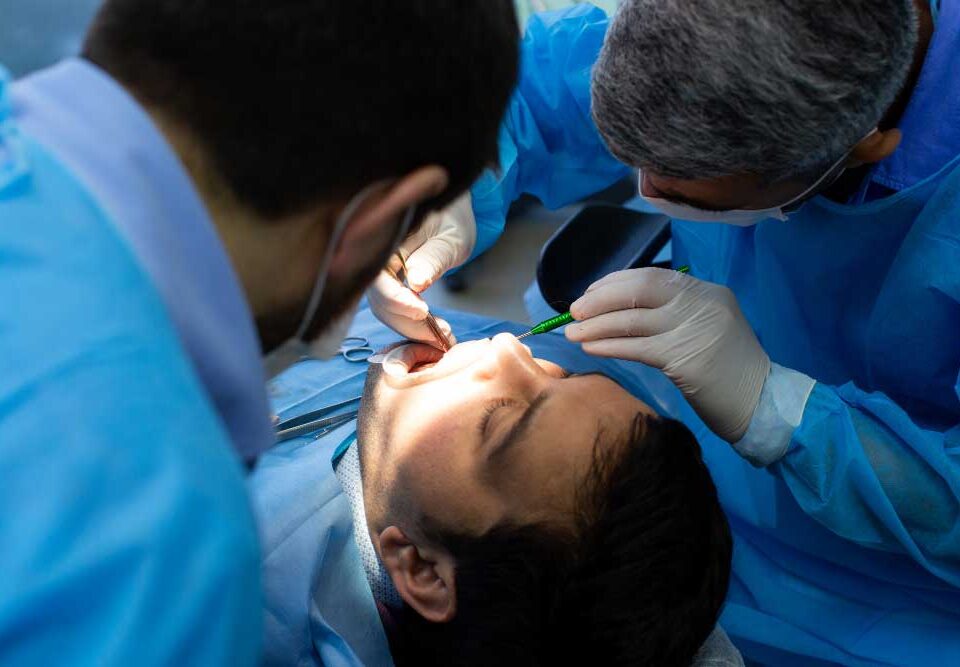
When Is It Safe to Use a Straw After Wisdom Teeth Removal? Learn More Here
September 16, 2024
The Step-by-Step Guide to Eating Crunchy Foods After Wisdom Teeth Removal
November 21, 2024
Table of Contents
ToggleWisdom teeth can feel like the mischief-makers of your mouth, often arriving late to the party and causing more trouble than they’re worth. But what are they for, and do we even need them anymore? Let’s take a look at how these teeth evolved, why they often need to go, and what to expect if your dentist gives them an eviction notice.
The Evolution of Wisdom Teeth
Once upon a time, wisdom teeth were a key part of survival. Early humans ate a lot of raw plants, roots, and meat, which meant their teeth took quite the beating. Extra molars were helpful to grind down tough food and replace worn-out teeth. Fast forward to today, and we’re not gnawing on raw mammoth steaks anymore. Modern diets are softer, and dental hygiene has come a long way, so those third molars often don’t have much to do.
Unfortunately, evolution is a slowpoke. While our jaws have gotten smaller over time, wisdom teeth still show up, like that one friend who insists on crashing your cozy dinner plans. Because many people don’t have enough room for them, these teeth tend to cause problems more often than not.
What Role Do Wisdom Teeth Play?
Now, if your wisdom teeth come in without a hitch, they’re just extra molars in the back of your mouth. They can help with chewing, but most of us don’t really need them for that anymore. Many people don’t have room for them, which can lead to issues like impaction—when the teeth get stuck in the gums or push against neighboring teeth.
Signs of Impacted Wisdom Teeth
Impacted wisdom teeth are like a ticking time bomb, and they can cause more trouble than they’re worth. Here are a few red flags to watch out for:
- Pain: It’s usually the first and most obvious sign. You might feel it in your jaw or even radiating to your ear.
- Swelling: Gums can get inflamed, swollen, or tender.
- Infection: Sometimes, the gums around the impacted tooth can become infected, leading to bad breath or a bad taste in your mouth.
- Difficulty opening your mouth: If things feel a bit stiff, your wisdom teeth could be causing the problem.
- Crowding: Wisdom teeth can push your other teeth out of alignment, messing up any orthodontic work you’ve had done.
When Is Wisdom Teeth Removal Necessary?
If you’re experiencing any of these symptoms, or if your dentist spots potential trouble on an X-ray, they might suggest wisdom teeth removal. It’s not as scary as it sounds! Dentists and oral surgeons have done it countless times and know how to make the process as smooth as possible.
Even if you’re not feeling any pain, your dentist might still recommend wisdom teeth removal in Melbourne. This is because wisdom teeth can cause problems later on, even if they seem fine now. They might stay hidden in your gums and damage your other teeth or cause cysts. It’s often better to remove them early rather than wait for problems to arise.
What Does the Procedure Entail?
If you’re facing the big day of removal, you’re probably wondering what to expect. The wisdom teeth removal cost varies depending on where you live, the complexity of the procedure, and whether or not you need sedation. For instance, if you’re in Melbourne, searching for “wisdom teeth removal near me” will give you a list of local dental clinics and their rates. Expect to pay anywhere from a few hundred to a couple of thousand dollars, depending on how many teeth need to be pulled.
Once the procedure is done, the wisdom teeth removal recovery process kicks in. It’s usually quick, but there are a few tips and tricks to make sure you heal well and avoid complications. Most people are back to their normal routine in a week or two.
Post-Removal Diet Tips for a Speedy Recovery
After your surgery, your mouth is going to be a little tender, so sticking to a soft diet is key to a smooth recovery. Here are some of the best foods to eat after wisdom teeth removal:
- Broths and soups: They’re easy to swallow and won’t irritate your gums.
- Smoothies: Packed with nutrients and easy to drink, just avoid using a straw to prevent dry socket.
- Mashed potatoes: Comfort food at its finest! Make sure they’re smooth and creamy.
- Yogurt: Cold and soothing, yogurt is a good option when your mouth feels a little sore.
- Scrambled eggs: Soft and packed with protein to help with healing.
Foods to avoid include anything hard, crunchy, spicy, or too hot. You don’t want to irritate the area or get food particles stuck in the socket. Most importantly, steer clear of straws—suction can dislodge the blood clot that helps your gums heal.
Recovery Duration and Tips
Your wisdom teeth removal recovery generally takes about 3-7 days, depending on how your body heals and how complicated the surgery was. Here are a few quick tips to make sure everything goes smoothly:
- Rest up: Take it easy for at least a day or two.
- Ice it: Use cold compresses on your jaw to reduce swelling.
- Rinse gently: After 24 hours, rinse your mouth with warm salt water, but be gentle.
- Avoid smoking: Smoking can delay healing and increase your risk of complications.
- Follow your dentist’s instructions: Stick to the aftercare plan your dentist gives you to ensure a speedy recovery.
And if you’re worried about the wisdom teeth removal price, it’s best to ask your dentist for a detailed estimate beforehand. Some dental clinics in Melbourne offer payment plans or might even be covered by insurance, so don’t be afraid to inquire.
FAQs About Wisdom Teeth Removal
1. What happens if I don’t remove my wisdom teeth?
If your wisdom teeth aren’t causing any problems, your dentist might take a “wait and see” approach. However, leaving them in can lead to future issues like pain, infection, tooth crowding, or even cysts around the impacted teeth. These problems tend to worsen over time. It’s often better to remove wisdom teeth before they start causing trouble, especially if your dentist sees signs of potential impaction. Regular checkups and X-rays help monitor their development and spot problems early.
2. How painful is wisdom teeth removal?
During the procedure, you won’t feel pain since your dentist or oral surgeon will use anesthesia. After the anesthesia wears off, mild discomfort and swelling are common for the first few days. Over-the-counter painkillers usually help manage this. Some people experience more swelling or soreness depending on how complicated the extraction was. Following your dentist’s post-op care instructions and resting will help minimize discomfort. Ice packs and soft foods are also great ways to make recovery smoother.
3. How long does the wisdom teeth removal procedure take?
The actual procedure for wisdom teeth removal typically takes between 45 minutes to an hour, depending on the complexity and number of teeth being extracted. If your teeth are impacted or require more intricate surgery, the process may take slightly longer. You’ll likely spend some additional time in the dental office for preparation and post-procedure recovery, especially if sedation or general anesthesia is used. After the procedure, you’ll be monitored for a short while before being sent home with specific care instructions for a smooth recovery.
4. How much does wisdom teeth removal cost?
The teeth removal cost varies depending on factors like how many teeth need to be extracted, whether the teeth are impacted, and where you live. For example, in Melbourne, prices can range from a few hundred to a couple of thousand dollars. Complex surgeries or sedation may increase the cost.
5. How long does it take to recover from wisdom teeth removal?
Most people can return to normal activities within 3 to 7 days after surgery, though complete healing may take a couple of weeks. The recovery process depends on factors like the complexity of the extraction and your body’s healing speed. To speed up recovery, follow your dentist’s post-op instructions, avoid strenuous activities, and stick to soft foods. Remember, everyone’s body heals differently, so it’s essential to listen to your own recovery cues and not rush back to your routine too soon.
6. What should I eat after wisdom teeth removal?
Right after surgery, stick to soft foods that are easy to chew and won’t irritate the extraction site. Good options include soups, smoothies, mashed potatoes, yogurt, and scrambled eggs. Avoid hard, crunchy, or spicy foods, as well as hot beverages that can irritate your gums. Also, skip using straws since the suction can dislodge the blood clot needed for healing. Following these diet tips for the first few days will promote a faster, smoother recovery, helping you feel more comfortable post-surgery.



